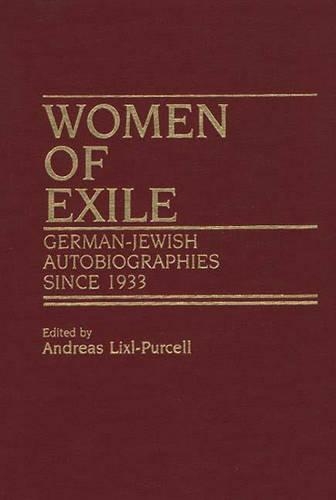
Women of Exile: German-Jewish Autobiographies Since 1933
(Hardback)
Publishing Details
Women of Exile: German-Jewish Autobiographies Since 1933
By (Author) Andreas Lixl Purcell
Bloomsbury Publishing PLC
Praeger Publishers Inc
24th June 1988
United States
Classifications
Tertiary Education
Non Fiction
Civics and citizenship
920.72089924043
Physical Properties
Hardback
241
Description
Lixl-Purcell . . . has chosen twenty-six from the hundreds of unpublished memoirs he researched. They are arranged in three sections--Persecution and Displacement, Exile and War, and Exile in Hindsight. Much of the power of their stories lies in their matter-of-fact and straightforward telling of their fears, narrow escapes, sorrows, and triumphs. There are narratives describing women's social, cultural and political networks before and after immigration, the isoilated struggles of individuals, their work as legal or illegal aliens abroad, and their involvement with underground resistance movements. American Library Book Review Women's exile autobiographies, written usually for an audience of relatives and fellow travellers, are rarely made available to the public. This is particularly true for Jewish women who fled Germany after Hitler's rise to power in 1933. In this unusual volume, the memoirs, diaries, and letters of twenty-six of these extraordinary women are published together for the first time. Their recollections paint a provocative profile of exile life and cover a broad spectrum of emigre history on every continent. While each memoir voices an intensely personal explanation, their combined effect is to launch a radical reinterpretation of women's roles, fates, and destinies.
Reviews
"Lixl-Purcell says in his introduction, Dedicated to a truth that no one wanted to hear, and written for an audience of relatives and fellow travelers, women's exile autobiographies rarely reach the public they deserve.' He has chosen twenty-six from the hundreds of unpublished memoirs he researched. They are arranged in three sections--Persecution and Displacement;' Exile and War, ' and Exile in Hindsight.' With the exception of Hilde Domin, whose lyrical prose in Among Acrobats and Birds' proclaims her a poet, most of these women were not writers. Much of the power of their stories lies in their matter-of-fact and straightforward telling of their fears, narrow escapes, sorrows and triumphs. There are narratives describing women's social, cultural and political networks before and after immigration, the isolated struggles of individuals, their work as legal or illegal aliens abroad, and their involvement with underground resistance movements. These were suddenly no longer powerless and vulnerable housefraus, but strong and determined women fighting for their own and their children's lives. . . . A few of the authors have returned to Germany, but most remained in their adopted homelands which included North and South America, Europe, Asia and Australia. Charlotte Stein-Pick ends the book with a plea to young Germans to love their country without arrogance as their homeland, as it once was to the German Jews. Only then will you be able to comprehend our grief.' These sad and courageous stories add a feminine perspective to Holocaust literature as well as to women's history. This is a valuable book for general readers and particularly for those who shared this experience and theirchildren and grandchildren."-Academic Library Book Review
Lixl-Purcell says in his introduction, Dedicated to a truth that no one wanted to hear, and written for an audience of relatives and fellow travelers, women's exile autobiographies rarely reach the public they deserve.' He has chosen twenty-six from the hundreds of unpublished memoirs he researched. They are arranged in three sections--Persecution and Displacement; ' Exile and War, ' and Exile in Hindsight.' With the exception of Hilde Domin, whose lyrical prose in Among Acrobats and Birds' proclaims her a poet, most of these women were not writers. Much of the power of their stories lies in their matter-of-fact and straightforward telling of their fears, narrow escapes, sorrows and triumphs. There are narratives describing women's social, cultural and political networks before and after immigration, the isolated struggles of individuals, their work as legal or illegal aliens abroad, and their involvement with underground resistance movements. These were suddenly no longer powerless and vulnerable housefraus, but strong and determined women fighting for their own and their children's lives. . . . A few of the authors have returned to Germany, but most remained in their adopted homelands which included North and South America, Europe, Asia and Australia. Charlotte Stein-Pick ends the book with a plea to young Germans to love their country without arrogance as their homeland, as it once was to the German Jews. Only then will you be able to comprehend our grief.' These sad and courageous stories add a feminine perspective to Holocaust literature as well as to women's history. This is a valuable book for general readers and particularly for those who shared this experience and theirchildren and grandchildren.-Academic Library Book Review
Author Bio
ANDREAS LIXL-PURCELL is Assistant Professor of German at the University of North Carolina at Greensboro, where he teaches modern literature and culture.
